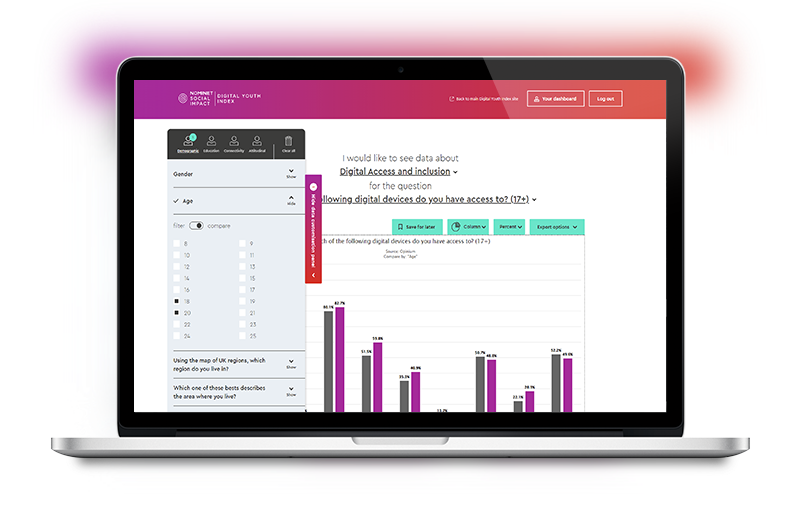With Safer Internet Day 2023 taking place tomorrow, we’re deep diving into our data surrounding young people and their perceptions of online safety. Watch the video below to hear from young people about their awareness and personal experiences of online safety and their recommendations for those at the forefront of educating children on this topic. They also share tips and advice for their peers and other young people to help them to stay safe online.
Data from this year’s research shows that young people are most likely to learn about internet safety from their parents (51%) and/or teachers (37%). As our young people mention, in primary school the online safety curriculum seems to cover the more basic subjects, such as cyberbullying, ‘stranger danger’, and keeping passwords safe. Interestingly, the older interviewees in the video felt that this is not enough in today’s constantly evolving digital age. The activities young people are involved in online now require a more sophisticated approach to ensure more realistic and complex matters are being captured.
“Some things that we do fall under that [don’t talk to strangers] category, and we just don’t know, so like on YouTube comments and stuff like that, we don’t think that’s talking to strangers, but we never know the people we can encounter when we’re writing or like replying to certain people. We find out the hard way.”
At secondary school, young people report how online safety education and training in schools focuses on raising awareness of online dangers, with grooming, phishing and fraud being the key areas, but not necessarily preparing for how to react should these things happen. When listening to the young people in our video, this message is reinforced and it appears online safety education is not evolving at the same speed as young people, with their exposure and curiosity beginning to peak around this stage. One of the interviewees emphasises the importance of having strong internet safety knowledge and puts forward the suggestion of having more lessons with an online safety module being taught as often as every month.
The topics and themes that are taught in school are mirrored at home, but to different degrees. When it comes to online safety, our research shows that young people feel they cannot rely on the privacy of their devices or connections; they express concern about the repercussions of open discussions about safety with their parents or carers, for fear of their internet usage being limited or monitored by adults as a safety measure or punishment. One of our video interviewee’s states:
“If something happens online, then you should obviously straight away tell them [parents].”
Although this may be the well-known message that is taught and understood, it does not necessarily come to fruition with 6% of young people saying they would not trust anyone to help them if they saw something that made them feel unsafe online. This means there are hundreds of thousands of young people who could find themselves dealing with an internet safety risk alone.
There is also a question around the perceived credibility of older generations to help with these issues. Some young people suggest that advice offered by parents and/or society may no longer be relevant for modern times, especially as the norms around meeting strangers through the internet have changed.

Many young people lack reliable and authoritative sources to learn about staying safe online; 43% of young people say they taught themselves about online safety with 28% learning about it from the internet. To allow us to move forward with online safety we must identify the issues and perceived blockers that really matter to young people and understand the changes they want to see. This is exactly why we are supporting this year’s Safer Internet Day and its theme ‘Want to talk about it? Making space for conversations about life online’. We are looking forward to celebrating putting young peoples’ voices at the heart of the day, whilst encouraging them to shape the online safety support they receive.
Want to a dig a bit deeper into our findings around internet safety? Use our data tool to uncover insights around young people’s attitudes, behaviours, perceptions and experiences of growing up online.
Thanks to the support of Nominet, Safer Internet Day 2023 will reach more young people than ever before with its crucial digital safety messages as part of our commitment to ensuring the online world is connected, inclusive and secure for all.
In 2022, we committed £5.1m funding for the next three years for UK Safer Internet Centre, after financial backing from the European Union ended.
Share this article








